Archive
‘Climate Change: Which way out?’ with Naomi Klein, Bill McKibben, Chris Hedges, Bernie Sanders, Kshama Sawant
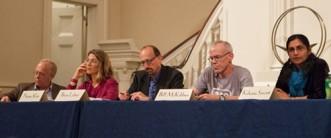
From left: Chris Hedges, Naomi Klein, Brian Lehrer (moderator), Bill McKibben, Kshama Sawant
I was fortunate to attend the largest climate change march in history on September 21, 2014 in New York City. It was an incredible experience to see roughly 400,000 in the streets demanding urgent action on the climate crisis.
The night before the event, there was a great panel discussion featuring Naomi Klein (author of ‘This Changes Everything: Capitalism vs. the Climate’), Bill McKibben (founder of 350.org), Chris Hedges (author and former New York Times correspondent), U.S. Senator Bernie Sanders, and Kshama Sawant (newly elected socialist councilor in Seattle who helped implement a $15/hr minimum wage in the city). It was an incredible night and the atmosphere at the All Souls Unitarian Universalist Church in Manhattan was electric, as you will hear.
Below are the speeches of the five panelists speaking on September 20, 2014 in New York:
Bernie Sanders – U.S. Senator from Vermont
[audio https://earthgauge.files.wordpress.com/2014/11/berniesanders-sept20-2014.mp3]—
Bill McKibben – author, activist and co-founder of 350.org
[audio https://earthgauge.files.wordpress.com/2014/11/billmckibben-nyc-sept20-2014.mp3]—
Naomi Klein – journalist and author of ‘This Changes Everything: Capitalism vs. The Climate’
[audio https://earthgauge.files.wordpress.com/2014/11/naomiklein-nyc-sept20-2014.mp3]—
Chris Hedges – author and former war correspondent for the New York Times
[audio https://earthgauge.files.wordpress.com/2014/11/chrishedges-nyc-sept20-2014.mp3]—
Kshama Sawant – Seattle city counselor
[audio https://earthgauge.files.wordpress.com/2014/11/kshamasawant-nyc-sept20-2014.mp3]
Greenland Inuit Village Fights for Survival

The people of Uummannaq are trying to adapt in order to survive. Photo: Mark Brooks
My documentary on the impacts of climate change in the Greenlandic village of Uummannaq aired in December on the Deutsche Welle international radio program Living Planet. I recorded and produced this report while working as the on-board journalist during the 2013 Students on Ice Arctic Expedition.
Located on a small island off the Greenland coast, 600 km (372 miles) north of the Arctic Circle, Uummannaq is one of many Inuit communities in the North that are already experiencing the impacts of climate change. Not only is the massive Greenlandic ice sheet melting, sea ice is starting to disappear too. This is causing serious difficulties for those working in the local fishing industry who depend on reliable sea ice conditions for their daily catch.

Fishermen in Uummannaq. Photo: Mark Brooks
Traditionally, fishers here worked on a dog sled on the sea ice in winter and by boat when the ice melted in the summer. But now, as the ice is melting earlier and becoming less stable, there is a period of several months in the spring when the ice is not strong enough to hold dog sleds but can also not be penetrated by small fishing boats. This is leading to a host of social and economic problems for the small community.
Click here to listen to the documentary. The text of the story with accompanying photos is available on the DW web site.
EG Radio May 16: Our last show of the season! The human costs of climate change with Andrew Guzman
[audio https://earthgauge.files.wordpress.com/2013/05/earthgauge-podcast-may16-2013.mp3]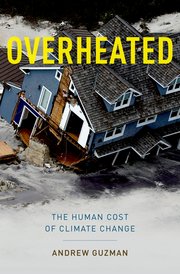
This week is our last show before the summer break! I’m taking a few months off to recharge the batteries so we’re ready to come back strong in September for an all new season. On today’s program, we’re going to hear an interview from our friends at Generation Anthropocene who talked recently with international law expert Andrew Guzman. He has taken a step back from analyzing climate change in terms of precise temperature changes, melting glaciers and meters of sea level rise and breaks down all the ways climate change will affect humanity, from environmental refugees to changing disease patterns to social conflict. His new book, Overheated: The Human Cost of Climate Change, illustrates how nearly all of our human systems interact with climate and will feel the effects of even a 2 degrees C rise in average global temperatures.
We’ll also have our usual update from Kathy of Ecology Ottawa on local environmental events and campaigns. This week’s listing includes the Great Glebe Green Garage Sale happening on May 25. It’s a huge annual event in Ottawa that you won’t want to miss.
Right click here to download the whole program.
Interesting times indeed on the environmental front these days and the summer ahead should be an eventful one. Earlier this week the world passed an ominous milestone when atmospheric concentrations of CO2 passed the 400 parts per million (ppm) threshold for the first time in human history. That’s right folks, when the industrial revolution began, the concentration of CO2 in our atmosphere was roughly 280 ppm but after a couple hundred years of burning fossil fuels such as coal and oil, we have emitted enough carbon into the air to push CO2 levels to 400 ppm. The last time the world saw this level of CO2 in the air was several million years ago, when the Arctic was ice-free, savannah spread across the Sahara desert and sea level was up to 40 metres higher than today. Many scientists believe these conditions are expected to return in time, with devastating consequences for civilization, unless emissions of CO2 from the burning of coal, gas and oil are rapidly curtailed. But despite increasingly severe warnings from scientists and a major economic recession, global emissions have continued to soar unchecked.
The world’s governments have agreed to keep the rise in global average temperature to 2 degrees C, the level beyond which some scientists feel catastrophic warming could become unstoppable. We’ve already seen about 1 degree of warming but the International Energy Agency warned in 2012 that on current emissions trends the world will see 6C of warming, a level scientists warn would lead to chaos. With no slowing of emissions seen to date, there is already mounting pressure on the UN summit in Paris in 2015, which is the deadline to settle a binding international treaty to curb emissions.
Writing in the Guardian newspaper, the excellent columnist George Monbiot called the 400 ppm milestone a moment of symbolic significance on the road to idiocy. It represents “a profound failure of politics, in which democracy has quietly been supplanted by plutocracy. Without a widespread reform of campaign finance, lobbying and influence-peddling and the systematic corruption they promote, our chances of preventing climate breakdown are close to zero.”
Meanwhile back here in Canada, this comes at a time when the voters in B.C. have returned the Liberal government of Christy Clark to power, much to everyone’s surprise. The NDP, who just about everyone expected to win the election, had opposed both the proposed Northern Gateway and Kinder Morgan tar sands pipelines from Alberta to the BC coast. The Liberal government has not ruled these projects out. Instead Clark has set some stringent conditions that must be met before her government will give its support, at least to the Gateway proposal. Let’s remember that the production of tar sands crude is estimated to emit 14 to 20 percent more planet-warming gases than the conventional oil that is typically found in U.S. refineries.
Will the pipeline projects now go ahead? And what about Keystone XL? A decision by President Obama on this project is expected in the coming months. Against this backdrop, we hear an interview today with international law expert Andrew Guzman, courtesy of the excellent podcast Generation Anthropocene, in which Guzman discusses his new book ‘Overheated: The Human Cost of Climate Change‘.
EG Radio May 9: the Kalamazoo River oil spill 3 years later

Photograph: State of Michigan
This week on Earthgauge, we take a look back at what happened in Michigan in 2010 when an Enbridge pipeline ruptured spilling roughly 1 million gallons of oil into the Kalamazoo River. What is the legacy of the spill and is there anything for the rest of us to learn as we debate the construction of more pipelines from the tar sands of Alberta to B.C. and the Gulf of Mexico?
I have 3 interviews on the program today:
- Susan Connelly, a local resident of Marshall, MI where the spill occurred
- Jeff Insko, founder of the Line 6B citizen’s blog, a web site for residents who have pipelines running directly beneath their property
- Josh Mogerman, spokesperson for the Natural Resources Defence Council
We’ll also have our usual update from Kathy of Ecology Ottawa on local environmental events and campaigns.
Click the audio player above to stream the show or right click here to download.
Thanks to a fellowship from the Institute for Journalism and Natural Resources, I had the opportunity to travel to Kalamazoo and the surrounding area last week to learn about the Kalamazoo River and, in particular, the Enbridge oil spill of 2010.
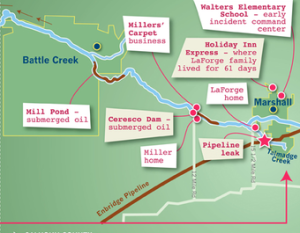
On Sunday, July 25, 2010, Enbridge Line 6B ruptured near Marshall, Mich. and released more than one million gallons of tar sands diluted bitumen into Talmadge Creek and the Kalamazoo River. Illustration by Catherine Mann for InsideClimate News.
Remember that one? It happened on July 25 just a couple weeks after BP finally sealed their leak in the Gulf of Mexico following the explosion of the Deep Water horizon oil rig that killed 11 workers.
Six inches of rain fell in the days after the Enbridge pipeline spill, raising Talmadge Creek and the Kalamazoo River into “a roiling brown torrent that overflowed its banks by several feet,” according to the seven-month, Pulitzer prize-winning investigation conducted by InsideClimate News. Talmadge Creek, which is usually five to six feet wide and a foot deep, stretched 100-feet wide after the downpour.
The spill occurred in Marshall, a community of 7,400 in southwestern Michigan. It drove 150 families permanently from their homes, yet the media spotlight never settled on their story — perhaps in part because this spill occurred 10 days after BP Plc’s Macondo well was finally capped after three months of spewing oil into the Gulf of Mexico.
Enbridge Energy Partners, a U.S. affiliate of Enbridge Inc., operated the pipeline. The company has spent more than $765 million cleaning up the spill.
Oiled sections of the Kalamazoo River reopened to the public in June 2012 — 23 months after the spill.

Photograph: State of Michigan
On today’s special show, we hear a couple different perspectives from residents who have been affected by the spill and its aftermath. First up is Susan Connelly, a local resident who was living near the oil spill when it occurred. Her kids daycare was just a half mile away so she tells us about some of the health effects her family and her community suffered immediately following the spill and in the intervening 3 years.
Susan Connelly (right click here to download):
Next we hear from another local resident Jeff Insko who started the Line 6B citizen’s blog. After the rupture of the pipeline known as line 6B, Enbridge decided to replace a huge section of pipe through Michigan, some of which runs through the property of local residents. Jeff will tell us why he has been less than satisfied in his dealings with Enbridge as they exercised their legal authority to do dig up his property and cut down all his trees in order to install new pipe. Will his experience be echoed by many other property owners as new pipelines are constructed in the coming years across North America?
Jeff Insko (right click here to download):
Finally, we hear from Josh Mogerman of the Natural Resources Defense Council on why he feels tar sands oil is much more difficult and problematic to transport through pipelines than conventional crude and how this may have played a role in the Kalamazoo spill.
Josh Mogerman (right click here to download):
First though, to get some context on what actually happened in the summer of 2010, we hear a piece from The Rachel Maddow Show on MSNBC, which was broadcast in July 2012 following the release of the US National Transportation Safety Board’s scathing report about Enbridge’s handling of the spill and their mistakes leading up to it.
Why does a pipeline rupture in Michigan matter? Well, because many plans are afoot for new pipelines from the tar sands of Alberta, including proposals through the US in the form of the Keystone XL pipeline and to the west coast of B.C. with the Northern Gateway pipeline. So today we’re going to find out about the experiences of local residents looking back 3 years later at the Kalamazoo River spill in 2010. Let’s hope we’ve learned our lessons and don’t repeat the mistakes of Kalamazoo as we debate the merits of constructing new pipelines across North America to extract even more tar sands oil at ever increasing rates.
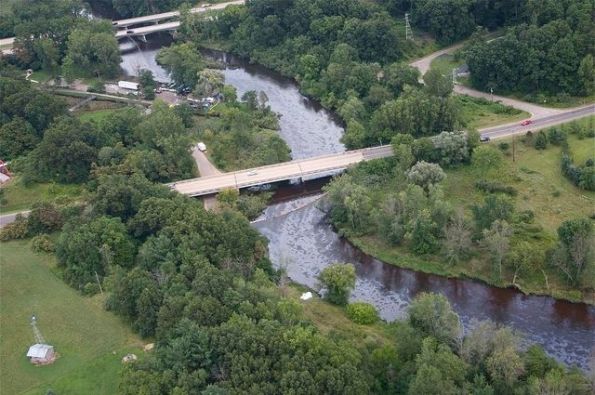
Photograph: State of Michigan
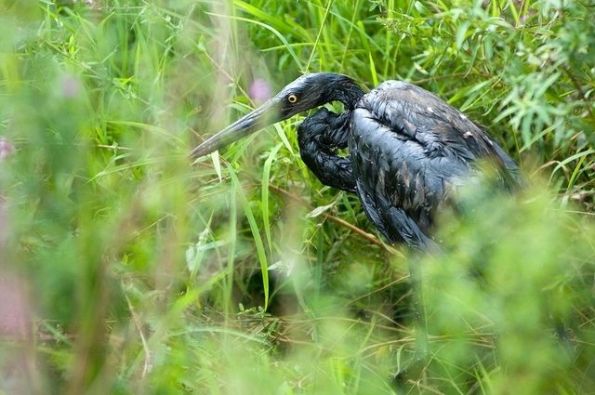
Photograph: State of Michigan
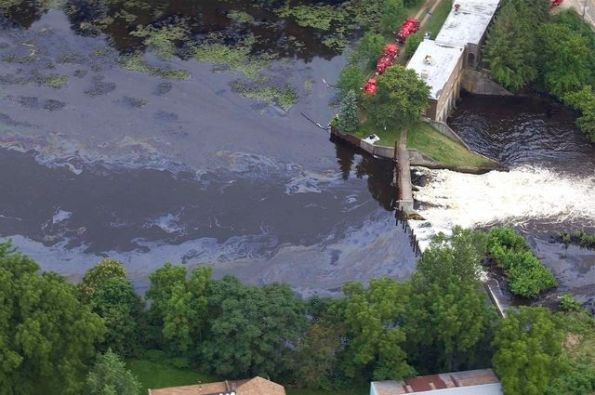
Photograph: State of Michigan
EG Radio April 25: The Future of Cities | Bike to Work month | Thomas Lovejoy
This week on Earthgauge, we have a veritable green medley with a jam-packed show covering everything from urban sustainability, climate change, biodiversity, biking to work and even the latest green news. I have 4 features today:
- Presentation by Alex Steffen called The Shareable Future of Cities
- Alex Smith’s interview with Dr. Thomas Lovejoy on biodiversity and climate change
- My interview with Jamie Stuckless of EnviroCentre on Bike to Work month in Ottawa
- This week’s green news from BradBlog.com
We also have our usual update on local environmental events and campaigns with Kathy of Ecology Ottawa. This week, Kathy also gives us some great cycling tips as we haul out the bikes after a long winter and welcome the arrival bike season.
Click the audio player above to stream the show or right click here to download.
Part 1 – Alex Steffen
First we’re going to pick up where we left off last week. During our last show, we talked about urban sustainability and the City of Ottawa’s Greenhouse Gas Roundtable. This week we start by hearing a presentation by Alex Steffen called The Shareable Future of Cities. Alex is a self-described Planetary Futurist and you’re going to want to hear what he has to say about the future of cities in an age of climate change.
Do you ever wonder whether we should be optimistic or pessimistic about the future? If you want more reasons to think things may still turn out for the better, Alex Steffen’s your man. He doesn’t downplay the scope and scale of the problems we face. Instead, he shows that we have the tools within our grasp for meeting those massive challenges, if we have the will to use them.
Steffen is a journalist, founder of Worldchanging.com and he edited an internationally best-selling book surveying innovative solutions to the planet’s most pressing problems: Worldchanging: A User’s Guide for the 21st Century. His most recent work is Carbon Zero, a book describing cities that create prosperity not climate change, accelerating their economies while reducing their climate emissions to zero.
Part 2 – Thomas Lovejoy
Next we hear from our friend Alex Smith of Radio EcoShock in Vancouver who recently spoke with the father of biodiversity, Thomas Lovejoy. Back in 1980, Dr. Thomas E. Lovejoy introduced the term “biological diversity” to the world. He has advised the United Nations, the World Bank, and 3 past Presidents and he’s a tireless advocate for endangered ecosystems that have no voice of their own. Lovejoy talks to Alex about the impacts of climate change on global biodiversity.
Part 3 – Bike to Work Month
Interview with Jamie Stuckless (right click here to download):
[audio https://earthgauge.files.wordpress.com/2013/04/jamie-stuckless-envirocentre-eginterview-04-25.mp3]May is Bike to Work month in Ottawa so I speak with Jamie Stuckless of EnviroCentre. On behalf of the City of Ottawa, the folks at EnviroCentre are organizing this annual event that encourages people to commute by bike and experience all of the health, economic and environmental benefits. Bike to Work month kicks off the spring season by encouraging seasoned riders and beginners to dust off the bikes and leave the car at home. You can even join the prize contest by visiting www.biketoworkottawa.com.
Part 4 – Green News
Next we turn it over to our friends Brad Friedman and Desi Doyen of BradBlog.com for the week’s listing of green news. On this episode, Brad and Desi discuss the 3rd anniversary of BP’s Oil Disaster in the Gulf; the US Environmental Protection Agency slamming the State Department’s Keystone XL report; and the release of environmental activist Tim de Christopher who was freed on Earth Day.
Part 5 – Bike tips and local environmental events and campaigns
Kathy’s bike tips (right click here to download):
[audio https://earthgauge.files.wordpress.com/2013/04/biketips-ecolottawa-kathy.mp3]
In addition to our usual weekly round-up of environmental events from Ecology Ottawa, this week Kathy also gives us some great biking tips to keep in mind as the spring and summer biking season gets underway.
Earthgauge Radio airs every Thursday morning at 7:00 AM on CKCU 93.1 FM in Ottawa and online around the world at www.ckcufm.com. Ottawa’s only radio program dedicated exclusively to environmental news and commentary from Ottawa, across the country and around the world. Podcasts on iTunes and right here on earthgauge.ca.
EG Radio April 11, 2013: Our 50th show! EcoBricks, Ontario Home Comfort and Rachel Carson
This week marks our 50th program since Earthgauge Radio was launched in the fall of 2011! So we’re celebrating a big milestone today and are sending out our thanks to all the guests we’ve had in the past year and a half, the numerous people who have contributed to the show, the whole CKCU radio family and of course to our faithful listeners for tuning in every week either live, online or by podcast.
On the program this week, we discuss Eco-bricks, saving energy (and money!) on home heating and the 50th anniversary of Rachel Carson’s book ‘Silent Spring’.
We also have our usual update from Kathy of Ecology Ottawa on local environmental events and campaigns.
Click the audio player above to stream the show or right click here to download.
Part 1 – Eco-bricks in Guatemala
(Right click here to download file)
Earthgauge contributor Xerez Bridglall brings us her interview with two Carleton University undergraduate students who participated in the Alternative Spring Break (ASB) program this year. ASB is an immersive year-long program that culminates with a week of cultural exchange and community service over reading week in February. Mario Pizzuto and Megan Stacey went on the ASB trip to Guatemala where they were involved in building a structure made out of eco-bricks, an environmentally friendly, additive free pressed kiln dried hardwood sawdust bricks used for home heating fuel in wood burning stoves, wood burning fireplaces and outdoor fire pits.
Part 2 – Saving energy and money at home
Right click here to download file.
James Keena of Ontario Home Comfort tells us about some ways for homeowners to upgrade to more energy efficient furnaces and hot water tanks, which can save you hundreds of dollars every year in energy costs and reduce your environmental footprint. You may also be eligible for additional government and Ontario Power Authority rebates.
Part 3 – 50th anniversary (sort of) of Rachel Carson’s ‘Silent Spring’
In honour of the 50th anniversary of the groundbreaking book ‘Silent Spring‘ by Rachel Carson, a book that many believe launched the environmental movement in the 1960s, today we feature a Democracy Now! interview with renowned author and environmental health activist Sandra Steingraber who reflects on the significant impact the book has had over the years.
‘Silent Spring’ documented detrimental effects of pesticides on the environment, particularly on birds. Carson accused the chemical industry of spreading disinformation, and public officials of accepting industry claims uncritically. When the book was published, Rachel Carson was already a well-known writer on natural history, but had not previously been a social critic. The book was widely read and inspired widespread public concerns with pesticides and pollution of the environment. Silent Spring facilitated the ban of the pesticide DDT in 1972 in the United States.
Earthgauge Radio airs every Thursday morning at 7:00 AM on CKCU 93.1 FM in Ottawa and online around the world at www.ckcufm.com. Ottawa’s only radio program dedicated exclusively to environmental news and commentary from Ottawa, across the country and around the world. Podcasts on iTunes and right here on earthgauge.ca.
EG Radio this week: EcoBricks, Ontario Home Comfort and Rachel Carson
On Earthgauge Radio this week, Xerez Bridglall will bring us her interview with two Carleton University undergraduate students who participated in the Alternative Spring Break (ASB) program this year. ASB is an immersive year-long program that culminates with a week of cultural exchange and community service over reading week in February. Mario Pizzuto and Megan Stacey went on the ASB trip to Guatemala where they were involved in building a structure made out of eco-bricks, an environmentally friendly, additive free pressed kiln dried hardwood sawdust bricks used for home heating fuel in wood burning stoves, wood burning fireplaces and outdoor fire pits.
Also on the show, I’ll be speaking with James Keena of Ontario Home Comfort. OHC offers ways for homeowners to upgrade to more energy efficient appliances such as furnaces and hot water tanks, which can save you hundreds of dollars every year in energy costs and reduce your environmental footprint. You may even be eligible for additional government and Ontario Power Authority rebates. We’ll find out more about this great program in my interview with James.
Finally, given that 2012 was the 50th anniversary of the groundbreaking book ‘Silent Spring‘ by Rachel Carson, a book that many believe launched the environmental movement in the 1960s, we’ll feature a Democracy Now! interview with renowned author and environmental health activist Sandra Steingraber who reflects on the significant impact the book has had over the years.
Earthgauge Radio airs every Thursday morning at 7:00 AM on CKCU 93.1 FM in Ottawa and online around the world at www.ckcufm.com. Ottawa’s only radio program dedicated exclusively to environmental news and commentary from Ottawa, across the country and around the world. Podcasts on iTunes and right here on earthgauge.ca.
Climate change is simple
Sometimes it helps to remind ourselves of the basic science of climate change and why scientists are so certain that the planet is warming and humans are to blame. David Roberts is a climate change and environment columnist at Grist. I’m not so sure about the somewhat distracting musical soundtrack in the background but it’s worth a look in any case.
“We are stuck between the impossible and the unthinkable. For the rest of your life, your job is to make the impossible possible.”
EG Radio March 28: Federal Budget 2013, urbanization in Kenya and the tar sands “staples” trap
We love covering local stories on Earthgauge and this week, we get just about as local as we can, focusing on some compelling environmental research taking place at Carleton University in Ottawa. We also take a look at the environmental provisions of last week’s federal Budget 2013. We have 3 interviews on today’s show:
- Glennys Egan on the environmental and human impacts of urbanization in Kenya
- Brendan Haley on the tar sands “staples trap”
- Andrew Van Iterson on the environmental measures in Budget 2013
We also have our usual update from Kathy of Ecology Ottawa on local environmental events and campaigns.
Click the audio player above to stream the show or right click here to download.
Part 1 – Budget 2013
Right click here to download.
To kick off the program this week, I speak with Andrew Van Iterson who is the manager of the Green Budget Coalition. Environmental funding in last week’s 2013 federal budget had very little in the way of environmental provisions. Sustainable Development Technology Canada, a government-funded venture capital firm that invests in environmental technology firms, will get $325 million over eight years and there is some funding for municipal projects, notably the City of Ottawa’s new wastewater holding tanks. But the green measures are pretty slim beyond that. The Green Budget Coalition, founded in 1999, brings together sixteen leading Canadian environmental and conservation organizations, which collectively represent over 600,000 Canadians, through our volunteers, members and supporters. They make an annual set of recommendations to the federal government regarding strategic fiscal and budgetary opportunities.
Part 2 – Glennys Egan
Right click here to download.
Next up Earthgauge contributor Juanita Bawagan speaks with Glennys Egan who is a Masters student in the African Studies program at Carleton whose research is based on issues of urbanization in Kenya. She has recently been in Kenya working with a community organization through Street Kids International based in a Nairobi slum and she tells Juanita about her research and experiences there, and the environmental and human impacts of urbanization in Kenya.
Part 3 – Brendan Haley
Right click here to download.
In the second half hour, I speak with Brendan Haley who is a PhD student at Carleton’s School of Public Policy and Administration and a fellow of the Broadbent Institute. He co-authored a recent study called ‘The Bitumen Cliff’ warning that the poorly regulated bitumen industry is creating a double threat to Canada: a so-called “staples trap,” with an economy over-reliant on bitumen exports, and a “carbon trap,” locking Canada into fossil fuels instead of adapting to climate change. The report was co-authored by the Canadian Centre for Policy Alternatives and the Polaris Institute.
Earthgauge Radio airs every Thursday morning at 7:00 AM on CKCU 93.1 FM in Ottawa and online around the world at www.ckcufm.com. Ottawa’s only radio program dedicated exclusively to environmental news and commentary from Ottawa, across the country and around the world. Podcasts on iTunes and right here on earthgauge.ca.
EG Radio March 14: food glorious food!
On Earthgauge this week, we discuss food security from the global to the local level, and what we can do to help build a more equitable and sustainable food system. From the geopolitics of global food (in)security to the  benefits of eating locally, this special program considers how the food choices we make on a daily basis have a real impact both on our environment and on the people who produce what we eat. Click the audio player above to stream the show or right click here to download.
benefits of eating locally, this special program considers how the food choices we make on a daily basis have a real impact both on our environment and on the people who produce what we eat. Click the audio player above to stream the show or right click here to download.
I have two interviews on today’s show:
- Matt Roney, a research associate at the Earth Policy Institute
- Heather Hossie of Just Food Ottawa
We also have our usual update from Kathy of Ecology Ottawa on local environmental events and campaigns.
Part 1 – Global food (in)security with Matt Roney of the Earth Policy Institute
[audio https://earthgauge.files.wordpress.com/2013/03/mattroney-earthpolicy-edited.mp3](Right click here to download)
Did you know the world has an additional 219,000 new mouths to feed each and every day? That’s the reality given current rates of global population growth and this is happening at a time when grain stocks around the world are dropping, water shortages are becoming more common and climate change is causing unprecedented droughts, flooding and heat waves, all of which are taking a toll on global food supplies. In his latest book, Full Planet, Empty Plates: the Geopolitics of Global Food Security, the pioneering environmentalist Lester Brown makes the case that food, not energy security, may well be our civilization’s weak link. Brown is the president of the Earth Policy Institute, a research organization based in Washington DC and I recently had the chance to speak about his new book with Matt Roney, a research associate at Earth Policy and in our interview he explained why world food supplies are tightening, the environmental, political and social implications of growing global food insecurity and what we need to do about it.
Part 2: Local food security and sustainability with Heather Hossie of Just Food
[audio https://earthgauge.files.wordpress.com/2013/03/heather-hossie-justfood-03-14-13.mp3](Right click here to download)
We have perhaps no closer connection to the land than through our food. Simply by making better and more informed food choices, we can have a real impact on helping to build a sustainable and equitable food system. For the local perspective, I speak with Heather Hossie of Just Food, an organization working for a sustainable and just food system here in Ottawa. She works on Community Economic Development (CED) initiatives at Just Food, a local grassroots, non-profit organization that is working to ensure that Ottawa is a food secure city and that our system of food production and distribution is environmentally, socially and economically just. Heather has been coordinating the Savour Ottawa initiative since its inception and also presents the Reel Food Film Festival each year. In our interview, she tells me what each of us can do to help support and promote a sustainable food system in our local communities.
Earthgauge Radio airs every Thursday morning at 7:00 AM on CKCU 93.1 FM in Ottawa and online around the world at www.ckcufm.com. Ottawa’s only radio program dedicated exclusively to environmental news and commentary from Ottawa, across the country and around the world. Podcasts on iTunes and right here on earthgauge.ca.